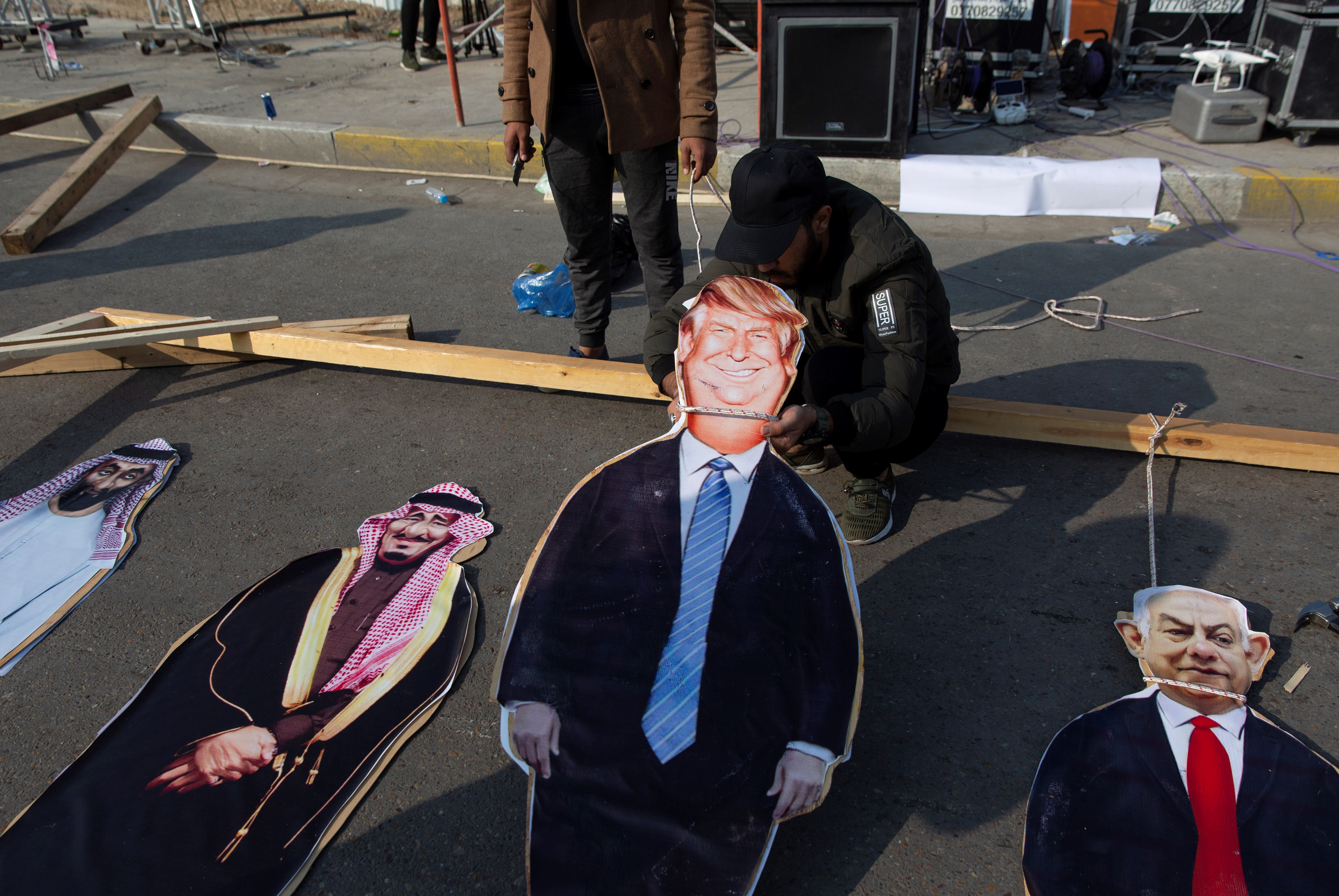Saudi leverages Netanyahu normalization ambitions for US agreements
The Kingdom of Saudi Arabia has set a price, through a list of demands only the US can broker, leveraging the Israeli Prime Minister's ambitions for normalization.
-

Activists prepare cardboard cutouts from right, Israeli Prime Minister Benjamin Netanyahu, US President Donald Trump, and Saudi Arabia's king Salman bin Abdulaziz are hung to a gallows, during a rally in Baghdad, Iraq, Saturday, Dec. 14, 2019 (AP).
The Kingdom of Saudi Arabia (KSA) has outlined a very high price in exchange for normalizing ties with "Israel", given that analysts in the New York Times report have reported that the kingdom has little to gain from openly normalizing ties with "Israel" since they already have that range from shared intelligence to state-of-the-art spyware.
In exchange for normalization, KSA, as outlined by the NYT report, made three primary demands: security guarantees from the US, assistance with developing a civilian nuclear program, and reduced restrictions on US arms sales.
The former US ambassador to "Israel" during the Clinton era, Martin Indyk, said, “It’s [list of demands] interesting for a number of reasons." Indyk explained that while Israeli Prime Minister Benjamin Netanyahu's government challenged the US Biden administration, the Israeli PM can't get what he "badly" wants on his own, "he can only get it with Biden’s help."
Moreover, Indyk said, “That creates a situation where Biden has leverage over Netanyahu to persuade him that nothing good can happen with Saudi Arabia if he allows the situation in the West Bank and East Jerusalem to explode.”
Read more: 'Israel' will not make concessions to Saudi Arabia: Saudi Sources
Nuclear powers and 'bad behavior'
For the US, Riyadh's demands are also problematic. For one, the NYT reported that US officials were concerned that KSA acquiring civilian nuclear power would be the "first step toward a nuclear weapon."
Additionally, it remained unclear what the "terms" for the suggested "security agreement" could amount to. The NYT report noted that people with knowledge of the issue suggested that "they are likely to be short of a mutual defense guarantee like the one that binds NATO nations."
Senator Christopher Murphy, a Democrat member of the Foreign Relations Committee had yet other concerns. Murphy said “Our relationship with Saudi Arabia has to be a direct bilateral relationship,” adding “It should not run through Israel.”
He who had pushed for the US arms sales restriction following KSA aggressions on Yemen with US weaponry, which funded the war on Yemen, highlighted that “the Saudis have been consistently behaving badly, over and over.”
The Senator continued, “If we’re going to enter into a relationship with the Saudis where we’re doing more significant arms sales, it should be in exchange for better behavior toward the United States, not just better behavior toward Israel.”
Netanyahu's ambitions on the table
It is important to note that Netanyahu considered a normalization agreement with KSA "a legacy of increasing Israel's security." Analysts from the NYT report argued that the deal would diminish the "relative importance of the Palestinian issue."
In an interview with the Italian newspaper La Repubblica, published on March 9, Netanyahu stated “I certainly believe that the peace agreement with the Saudis will lead to an agreement with the Palestinians.”
In the same interview, the PM also noted that "Nothing can guarantee the duration of a nation, but what we can do is protect our freedoms, using force if necessary, for as long as possible."
Read more: 'Israel' bribes Italy in return for recognizing Al-Quds as capital
The significance of these statements is that they have been made, while the axis of Resistance across Western Asia has reaffirmed Israeli occupation President Isaac Herzog's statement, made on the eve of the Knesset voting on the controversial judicial reforms, where he said, according to Israeli Yediot Ahronoth newspaper: "I see before me various divides that are growing deeper and more painful. At this time, I can only think about the fact that two times throughout history, a Jewish state was founded in Israel, and it collapsed twice before reaching 80."
In parallel Crown Prince Mohammed Bin Salman said in an interview with the Atlantic “We do not view Israel as an enemy, but rather as a potential ally."
For the longest time, it's been touted that Saudi Arabia was and is not a proponent of normalization, with people citing its past stances in support of Palestine and condemnation of Israeli violations against the Palestinian people. This is all well and good but Saudi Arabia’s real-world practices reveal another dimension of its relationship with “Israel”, one of an increasing intersection of interests that is leading up to public normalization.
Read more: Hiding behind one's Mecca: Israeli-Saudi covert normalization

 4 Min Read
4 Min Read








